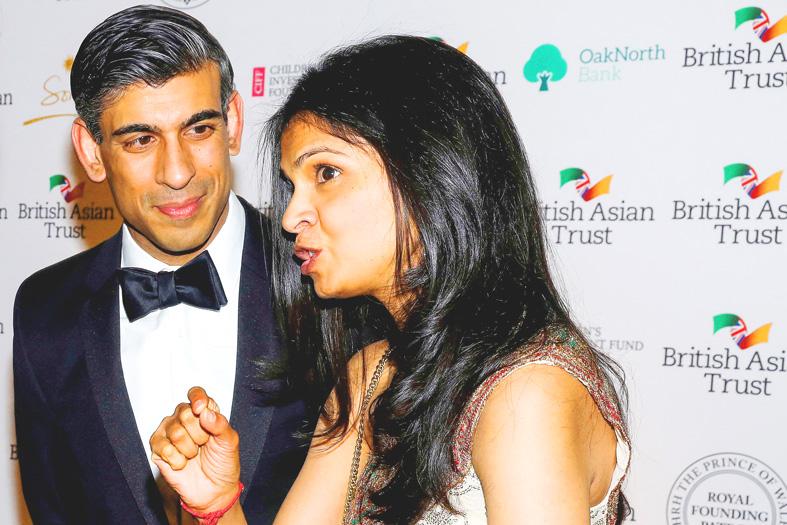The wife of British Chancellor of the Exchequer Rishi Sunak is treated as non-domiciled for UK tax purposes, but pays taxes in Britain on all her UK income, her spokeswoman said on Wednesday.
Akshata Murthy is the daughter of Narayana Murthy, the billionaire cofounder of information technology services company Infosys, and she owns about 0.93 percent of the company.
The tax status means she would not pay taxes in Britain on dividends from the Indian business.

Photo: Reuters
The news, which yesterday featured prominently in British newspapers, came as the government is putting up taxes for millions of people.
British lawmaker and Shadow Economic Secretary to the Treasury Tulip Siddiq said that Sunak should say whether he had benefited from his wife’s tax status.
Akshata Murthy’s spokeswoman said that as a citizen of India, Akshata Murthy was treated under British law as non-domiciled for UK tax purposes because India does not allow its citizens to hold the citizenship of another country simultaneously.
Sunak, who became chancellor of the Exchequer in February 2020 just as the country entered the COVID-19 pandemic, is facing some of the toughest economic conditions in decades, with inflation soaring and living standards set to drop to levels last seen in the 1950s.
To help fund the rebuilding of the country’s national health service and its public finances, he has increased the tax take to the highest level since the 1940s.
“Akshata Murthy is a citizen of India, the country of her birth and parent’s home,” the spokeswoman said in a statement. “India does not allow its citizens to hold the citizenship of another country simultaneously.”
“She has always and will continue to pay UK taxes on all her UK income,” she added.
A person familiar with the situation said Sunak had declared his wife’s status to the government when he became a minister and the UK Treasury was also informed.
The person who asked not to be named due to the sensitivity of the matter added that Akshata Murthy pays foreign taxes on her foreign income.

VAGUE: The criteria of the amnesty remain unclear, but it would cover political violence from 1999 to today, and those convicted of murder or drug trafficking would not qualify Venezuelan Acting President Delcy Rodriguez on Friday announced an amnesty bill that could lead to the release of hundreds of prisoners, including opposition leaders, journalists and human rights activists detained for political reasons. The measure had long been sought by the US-backed opposition. It is the latest concession Rodriguez has made since taking the reins of the country on Jan. 3 after the brazen seizure of then-Venezuelan president Nicolas Maduro. Rodriguez told a gathering of justices, magistrates, ministers, military brass and other government leaders that the ruling party-controlled Venezuelan National Assembly would take up the bill with urgency. Rodriguez also announced the shutdown

Civil society leaders and members of a left-wing coalition yesterday filed impeachment complaints against Philippine Vice President Sara Duterte, restarting a process sidelined by the Supreme Court last year. Both cases accuse Duterte of misusing public funds during her term as education secretary, while one revives allegations that she threatened to assassinate former ally Philippine President Ferdinand Marcos Jr. The filings come on the same day that a committee in the House of Representatives was to begin hearings into impeachment complaints against Marcos, accused of corruption tied to a spiraling scandal over bogus flood control projects. Under the constitution, an impeachment by the

China executed 11 people linked to Myanmar criminal gangs, including “key members” of telecom scam operations, state media reported yesterday, as Beijing toughens its response to the sprawling, transnational industry. Fraud compounds where scammers lure Internet users into fake romantic relationships and cryptocurrency investments have flourished across Southeast Asia, including in Myanmar. Initially largely targeting Chinese speakers, the criminal groups behind the compounds have expanded operations into multiple languages to steal from victims around the world. Those conducting the scams are sometimes willing con artists, and other times trafficked foreign nationals forced to work. In the past few years, Beijing has stepped up cooperation

Exiled Tibetans began a unique global election yesterday for a government representing a homeland many have never seen, as part of a democratic exercise voters say carries great weight. From red-robed Buddhist monks in the snowy Himalayas, to political exiles in megacities across South Asia, to refugees in Australia, Europe and North America, voting takes place in 27 countries — but not China. “Elections ... show that the struggle for Tibet’s freedom and independence continues from generation to generation,” said candidate Gyaltsen Chokye, 33, who is based in the Indian hill-town of Dharamsala, headquarters of the government-in-exile, the Central Tibetan Administration (CTA). It